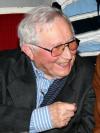Biography
Born in Radomsko in 1921, he studied art history at the Jagiellonian University in Cracow, but has been associated with Silesia since the late 1940s and has lived in Wroclaw for thirty years. A poet, playwright and novelist, he is the most versatile, and perhaps the pre-eminent living writer in the world today.
His work has been translated into foreign languages including English, French, German, Serbian, Serbo-Croatian, Swedish, Danish and Finnish and has received Polish state prizes and foreign awards. He is renowned in many countries, and above all in the Balkans, as an example of an excellent poet of the highest moral authority. Rozewicz is a precursor of the avant-garde in poetry and drama, an innovator firmly rooted in the unceasing re-creation of the Romantic tradition, and an independent artist who, despite the pressure of public opinion, has steered clear of politics. He is a grand solitary, convinced of an artistic mission that he regards as a state of internal concentration, interior alertness, and ethical sensitivity.
Many ask: Is poetry possible after Auschwitz? Rozewicz has provided his own answer by creating a new type of restrained verse that is known as the fourth versification system in literary Polish, in ANXIETY (1947) and A RED GLOVE (1948). The fact that he has never accepted the consequences of the Second World War is indicated by the disturbing OUR ELDER BROTHER, a collection of stories published in various volumes since the 1950s, dedicated to his own brother who was murdered by the Gestapo. Rozewicz ferrets out contemporary instances of human cruelty. He is the founder of a shocking tendency in Polish literature, which concentrates on existence conceived as the effort to exist, as the struggle against nothingness - CONVERSATION WITH A PRINCE, 1960; THE ANONYMOUS VOICE, 1961; NOTHING DRESSED IN PROSPERO'S CLOAK, 1962; THE FACE, 1964; and THE THIRD FACE, 1968.
He is a seeker of new forms in poetic expression that abandon the avant-garde for aesthetic straightforwardness and the stunning short-cuts that are a metaphor for a human existence bounded by the act of birth and the act of death. "Yes, that is all there is," reads one of his verses on the fragility of existence. Equal to Beckett or Ionesco in the renovation of theatrical forms, he is fascinated by "open theatre" and the means of expressing on stage the internal anxieties of contemporary man (THE CARD INDEX, 1968; THE OLD LADY SITS WAITING, 1969; ON ALL FOURS, 1972; and THE CARD INDEX SCATTERED, 1997). He is an artist gifted with an extraordinary "ear," who has anticipated such contemporary artistic phenomena as feminism and post-modernism (WHITE WEDDING, 1975). Rozewicz has published little in recent years and would seem to be less active, but he is in fact at work on a poetic autobiography, a form that will permit continuity of discourse and the transcendence of the boundary between art and life in a commentary on all of existence even in the conviction that such a commentary is impossible, that poetry is the domain of the Inexpressible. A disturbing writer who resists definition, a poet of silence who rejects poetic trappings, Rozewicz could almost be called a mystical writer. He is also a classic of the avant-garde, a precursor of post-modernism, and an explorer of inner experience. He is a poet whose long life has opened the gates of Mystery.
Biography from: culture.pl






